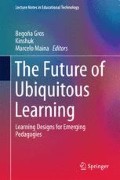Abstract
Traditionally, the quality of a course offering is measured based on learner feedback at the end of the offering. This chapter offers a method to measure the quality of a course offering—continually, formatively, and summatively—using factors such as the quality of resources used, learner motivation, learner capacity, learner competency growth, and instructor competence. These factors are represented in a Bayesian belief network (BBN) in a system called MI-IDEM. MI-IDEM receives streams of data corresponding to these factors as and when they become available, which leads to estimates of quality of the course offering based on individual factors as well as an overall quality of the offering. Continuous, formative, and summative course quality measurements are imperative to identify weaknesses in the learning process of students and to assist them when they need help. This chapter professes the need for a comprehensive measurement of course quality and ensuing initiatives to personalize and adapt course offerings. It presents two case studies of this novel approach: first, measurement of the quality of a course offering in a blended online learning environment and second, measurement of the quality of training course offering in an industry environment.
Access this chapter
Tax calculation will be finalised at checkout
Purchases are for personal use only
References
Boulanger, D., Seanosky, J., Baddeley, M., Kumar, V., & Kinshuk. (2014). Learning analytics in the energy industry: Measuring competences in emergency procedures. In Proceedings of the 2014 IEEE Sixth International Conference on Technology for Education (T4E) (pp. 148–155).
Boulanger, D., Seanosky, J., Kumar, V., Panneerselvam, K., & Somasundaram, T. S. (2015). Smart learning analytics. In G. Chen, V. Kumar, Kinshuk, R. Huang & S. C. Kong (Eds.), Emerging issues in smart learning (pp. 289–296). Berlin: Springer.
Bloom, B. S., Hastings, J. T., & Madaus, G. F. (1971). Handbook on formative and summative assessment of student learning. New York: McGraw Hill.
El Kadi, M., & Kumar, V. (2010). MI-IDEM: A model to evaluate instructional design using Bayesian belief networks. In Proceedings of the 2010 9th International Conference on Information Technology Based Higher Education and Training (ITHET) (pp. 1–8).
Forner, L., Kumar, V., & Kinshuk. (2013). Assessing design of online courses using bayesian belief networks. In Proceedings of the 2013 IEEE Fifth International Conference on Technology for Education (T4E) (pp. 36–42).
Hrmo, R., Kristofiakova, L., & Kučerka, D. (2012). Developing the information competencies via e-learning and assessing the qualities of e-learning text. In Proceedings of the 2012 15th International Conference on Interactive Collaborative Learning (ICL) (pp. 1–4).
Kumar, V., Boulanger, D., Seanosky, J., Panneerselvam Kinshuk, K., & Somasundaram, T. S. (2014a). Competence analytics. Journal of Computers in Education, 1(4), 251–270.
Kumar, V., Kinshuk, Clemens C., Harris, S. (2014b). Causal models and big data learning analytics. In Kinshuk & R. Huang (Eds.) Ubiquitous learning environments and technologies. Springer’s lecture notes in educational technology series (pp. 31–44).
Reumann, M., Mohr, M., Diez, A., & Dossel, O. (2008). Assessing learning progress and quality of teaching in large groups of students. In Proceedings of the 2008 30th Annual International Conference of the IEEE Engineering in Medicine and Biology Society (EMBS) (pp. 2877–2880).
Seanosky, J., Boulanger, D., Kumar, V., & Kinshuk. (2015). Unfolding learning analytics for big data. In G. Chen, V. Kumar, Kinshuk, R. Huang & S. C. Kong (Eds.), Emerging issues in smart learning (pp. 377–384). Berlin: Springer.
Smolin, D., & Butakov, S. (2012). Applying artificial intelligence to the educational data: An example of syllabus quality analysis. In Proceedings of the 2nd International Conference on Learning Analytics and Knowledge (pp. 164–169).
Tervakari, A., Silius, K., & Kailanto, M. (2013). Students’ participation in a social media enhanced learning environment. In Proceedings of the 2013 IEEE Global Engineering Education Conference (EDUCON) (pp. 871–879).
Zheng, L., El-Bishouty, M., Pinnell, C., Bell, J., Kumar, V., & Kinshuk. (2015). A framework to automatically analyze regulation. In G. Chen, V. Kumar, Kinshuk, R. Huang & S. C. Kong (Eds.), Emerging issues in smart learning (pp. 23–30). Berlin: Springer.
Zheng, L., Kumar, V., & Kinshuk. (2014). The role of co-regulation in synchronous online learning environment. In Proceedings of the 2014 IEEE Sixth International Conference on Technology for Education (T4E) (pp. 241–244).
Acknowledgements
We would like to acknowledge support from NSERC/iCORE/Xerox/Markin Research Chair, NSERC Discovery Grants, and Athabasca University, Canada.
Author information
Authors and Affiliations
Corresponding author
Editor information
Editors and Affiliations
Rights and permissions
Copyright information
© 2016 Springer-Verlag Berlin Heidelberg
About this chapter
Cite this chapter
Seanosky, J. et al. (2016). Measurement of Quality of a Course. In: Gros, B., Kinshuk, ., Maina, M. (eds) The Future of Ubiquitous Learning. Lecture Notes in Educational Technology. Springer, Berlin, Heidelberg. https://doi.org/10.1007/978-3-662-47724-3_11
Download citation
DOI: https://doi.org/10.1007/978-3-662-47724-3_11
Published:
Publisher Name: Springer, Berlin, Heidelberg
Print ISBN: 978-3-662-47723-6
Online ISBN: 978-3-662-47724-3
eBook Packages: EducationEducation (R0)

